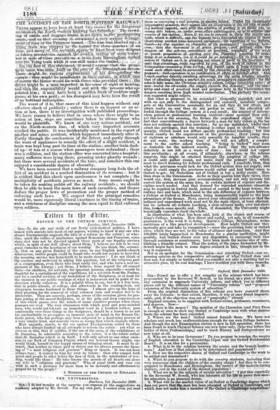THE ITNIVERSITIES.
.Durham, Tits December 1850. Sin—I do not wonder at the surprise you express at the suggestions so rp suddenly adopted by Mr. Sewell. For my own part, I cannot even yet read
them as conveying a rft.lpurpesfil, ;TIN e591".9b dais 9i1.10 01.g. impromptu).eauetioili they appgpf, ing -bathers,appppartl,.;ealy with the. w000g,.Side bere,.,erennder some owners of the-niotlityl.-.i.Xvsn• if 1;M :fug',
faith,• which is.dittieults, the
anotlietitinier O. al •
Ooaoh+:rbg ,this:
aaAnktme eistrii(f that -Oa ;
(hinge& let the q99tte 11194 cfroprottC. ploposttiokt 0 trhapitiatraodistaireesAaib notionfef Chtfo■Til eV%
tbfiladmittitasev- ilnivresnies •eournaMeg amid suet efftetenettetlbett tattlnittthete dirlret1 8elfraperat,i?P that or efrooung ibto -4 40444 *melte take house; i the isieii.Jssafti. for eductitien., tivity and want of practical bent a
' 4 ,uncrep uyed
there, college ,,the demanP, d' Ekp�i7 help in the Ua dangers.resulting from high mental exexca a i. This plethek= + the exten- sion suggested might relieve. But what is proposed to be extendert?'„1.0enerally regarded, and not with an eye only to the distinguished and, endowed, members congre- gate at the Universities nominally for an end they do not attain, and attain really an end they do not profess to seek : the education af- forded.through the College system is a real result; the amount of inform- ation gained or professional training received—more nominal than rea.14 yet this last is the seeming, the former the unprofessed object. And the fact that conventionally a degree forwards a man for holy orden3 oc the bar does not militate against this assertion ; for no one maintains, whilst the` admit the privileges, that the training is either legal or clerical. Cense", quently, Oxford could not diffuse specific professional teaching : but this would exactly be the requirement of the provinces ; there young men of eighteen or nineteen would only assemble for tangible results; they do not want, the working time of life will not . afford, a comple- ment to the earlier school teaching. " Going to 'Word" may seem so desirable for the indirect results, in itself, tlast', the non-advance is not felt as a waste of time : but it ;;eould not export this peculiarity ; at all events, if ultimately, elsewlitke, as the scheme suggests, this might be attained through the adopt; ttt of college life, it could only gather round, not make itself the priMary idea, which must be direct training for definite professional ends. I conclude, then, that what the provinces would look for the Oxford system does not supply, and what it could supply the provinces would rather and had better come to Oxford to get; for Oxfordisra out of Oxford is but a sickly exotic. Here then steps in the Commission. As far as their queries hint their views, the,y would say, first, increase your accommodation, and not only increase but correct the system at the same time, in certain matters of expense and dis- cipline much needed. And that demand for extended academic education may be supplied in Oxford itself, instead of carried to the large towns; the railway fare and back, which need be the sole difference of expense bet;ieen a College at Oxford or Manchester, being immeasurably repaid by the local advantages of the former. Next, correct your educational courses so that the indirect and unprofessed work need not be the main object, at least attained, but by (schools of) definite teaching, a clear advance made, over and above this,.towieds some specific end. Then, if demanded, the Tniversity might beneficially reproduce itself elsewhere. In illnstrstion of what has been said, lo'ok at the classes and course of King's College, London. How direct and useful, yet safe, in all reasonable guarantees, is the work it is doing. Queen's College, Birmingham, seems ambitious of a like practical development. How might Oxford and they mutually give and take byrecognition!--were the governing body at Oxford alive, which they are not, to the value of alliance and connexion. And that 100,0001. lately bequeathed to Manchester for a similar institution, might possibly, had Oxford shown ever' any clisposition to encourage such idea through assistance or countenance, have been made the means also of esta- blishing a friendly outpost. Thus the notion of the paper forwarded by Mr. Sewell might have been to some degree realized in fact, though not in the way it suggested.
Not as an apologist for the Commission—nor attacking Oxford—nor ex- pressing opinion on the comparative advantages of what Oxford does and does not, but simply as testing what you consider not only a startling but an attractive plan, by its real bearings, I have troubled you with these remarks. D. M.


























 Previous page
Previous page